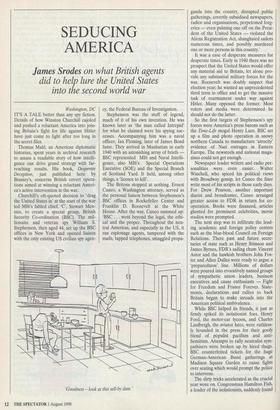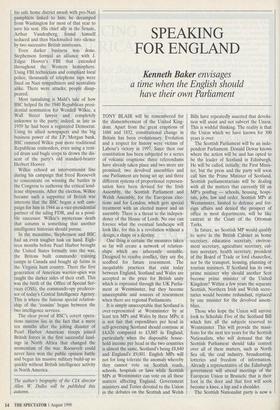SEDUCING AMERICA
James Srodes on what British agents
did to help lure the United States into the second world war
Washington, DC IT'S A TALE better than any spy fiction. Details of how Winston Churchill cajoled and pushed a reluctant America into join- ing Britain's fight for life against Hitler have just come to light after too long in the secret files.
Thomas Mahl, an American diplomatic historian, spent years in archival research to amass a readable story of how intelli- gence can drive grand strategy with far- reaching results. His book, Desperate Deception, just published here by Brassey's, concerns British covert opera- tions aimed at winning a reluctant Ameri- ca's active intervention in the war.
Churchill's oft-quoted decision to 'drag the United States in' at the start of the war led MI6's fabled chief, 'C', Stewart Men- zies, to create a special group, British Security Co-ordination (BSC). The mil- lionaire and veteran spy William S. Stephenson, then aged 44, set up the BSC offices in New York and opened liaison with the only existing US civilian spy agen- cy, the Federal Bureau of Investigation.
Stephenson was the stuff of legend, much of it of his own invention. He was known later as 'the man called Intrepid' for what he claimed were his spying suc- cesses. Accompanying him was a naval officer, Ian Fleming, later of James Bond fame. They arrived in Manhattan in early 1940 with an astonishing array of briefs — BSC represented MI6 and Naval Intelli- gence, also MI6's Special Operations Executive (SOE) and the Special Branch of Scotland Yard. It held, among other things, a 'licence to kill'.
The Britons stopped at nothing. Ernest Cuneo, a Washington attorney, served as the personal liaison between Stephenson's BSC offices in Rockefeller Center and Franklin D. Roosevelt at the White House. After the war, Cuneo summed up: 'BSC . . . went beyond the legal, the ethi- cal and the proper. Throughout the neu- tral Americas, and especially in the US, it ran espionage agents, tampered with the mails, tapped telephones, smuggled propa- 'Goodness - look at this sell-by date.' ganda into the country, disrupted public gatherings, covertly subsidised newspapers, radios and organisations, perpetrated forg- eries — even palming one off on the Presi- dent of the United States — violated the Aliens Registration Act, shanghaied sailors numerous times, and possibly murdered one or more persons in this country.'
It was a case of desperate measures for desperate times. Early in 1940 there was no prospect that the United States would offer any material aid to Britain, let alone pro- vide any substantial military forces for the war. Roosevelt was doubly suspect that election year; he wanted an unprecedented third term in office and to get the massive task of rearmament under way against Hitler. Many opposed the former. Most voters and media were determined he should not do the latter.
So the first targets of Stephenson's spy forces were America's press barons such as the Time-Life mogul Henry Luce. BSC set up a film and photo operation in snowy northern Canada to manufacture 'atrocity' evidence of Nazi outrages in Eastern Europe. The newsreels and national maga- zines could not get enough.
Newspaper leader writers and radio per- sonalities were even easier. Walter Winchell, who spiced his political views with Broadway gossip, let Cuneo the fixer write most of his scripts in those early days. For Drew Pearson, another important diarist and broadcaster, Cuneo arranged greater access to FDR in return for co- operation. Books were financed, articles ghosted for prominent celebrities, movie studios were prompted.
The next step was to infiltrate the lead- ing academic and foreign policy centres such as the blue-blood Council on Foreign Relations. There past and future secre- taries of state such as Henry Stimson and James Byrnes, FDR's sailing chum Vincent Astor and the hawkish brothers John Fos- ter and Allen Dulles were ready to argue a 'preparedness' line. Millions of dollars were poured into evocatively named groups of sympathetic union leaders, business executives and cause enthusiasts — Fight for Freedom and France Forever. State- ments, declarations and rallies to back Britain began to make inroads into the American political ambivalence.
While BSC helped its friends, it just as firmly spiked its isolationist foes. Henry Ford, the motor-car tycoon, and Charles Lindbergh, the aviator hero, were ruthless- ly hounded in the press for their goofy blend of populist pacifism and anti- Semitism. Attempts to rally neutralist sym- pathisers were broken up by hired thugs. BSC counterfeited tickets for the huge German-American Bund gatherings at Madison Square Garden to cause fights over seating which would prompt the police to intervene.
The dirty tricks accelerated as the crucial year wore on. Congressman Hamilton Fish, a leader of the isolationists, suddenly found his safe home district awash with pro-Nazi pamphlets linked to him; he decamped from Washington for most of that year to save his seat. His chief ally in the Senate, Arthur Vandenberg, found himself seduced and then blackmailed into silence by two successive British mistresses.
Even darker business was done. Stephenson formed an alliance with J. Edgar Hoover's FBI that extended throughout the Western hemisphere. Using FBI technicians and compliant local police, thousands of telephone taps were fixed on Nazi sympathisers and neutralists alike. There were attacks; people disap- peared.
Most tantalising is Mahl's tale of how BSC helped fix the 1940 Republican presi- dential nomination for Wendell Wilkie, a Wall Street lawyer and completely unknown to the party; indeed, as late as 1939 he had been a registered Democrat. Using its allied newspapers and the big business power of the J.P. Morgan bank, BSC rammed Wilkie past more traditional Republican contenders, even using a rent- ed drum and bugle corps to drown the dis- sent of the party's old standard-bearer Herbert Hoover.
Wilkie echoed an interventionist line during his campaign that freed Roosevelt to concentrate on winning the battles in the Congress to authorise the critical lend- lease shipments. After the election, Wilkie became such a supporter of British war interests that the BSC began a soft cam- paign for him in 1944 as a vice-presidential partner of the ailing FDR, and as a possi- ble successor. Wilkie's mysterious death that autumn is something that another intelligence historian should pursue.
In the meantime, Stephenson and BSC had an even tougher task on hand. Eigh- teen months before Pearl Harbor brought the United States formally into the war, the Britons built commando training camps in Canada and bought up farms in the Virginia hunt country. There the first generation of American warrior-spies was taught the darker sides of their craft. This was the birth of the Office of Special Ser- vices (OSS), the commando-spy predeces- sor of today's Central Intelligence Agency. This is where the famous special relation- ship of the 'cousins' began between the two intelligence services.
The clear proof of BSC's covert opera- tions success lies in the fact that a mere ten months after the jolting disaster of Pearl Harbor American troops joined British forces in the first successful land- ings in North Africa that changed the momentum of the war. Roosevelt could never have won the public opinion battle and begun his massive military build-up so quickly without British intelligence activity in North America.
The author's biography of the CM director Allen W. Dulles will be published this autumn.



























































 Previous page
Previous page